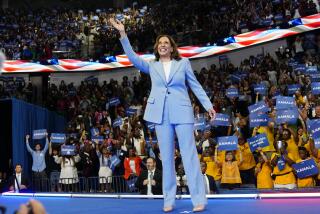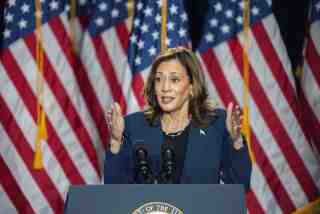Biden says he wants a female running mate. Who?
- Share via
WASHINGTON — Joe Biden set off a chorus of cheers by flatly declaring in the presidential debate Sunday night that his running mate would be a woman. A flurry of speculative chatter now follows.
Who could it be?
Biden, the front-runner for the Democratic presidential nomination, gave little indication, other than that he would choose someone “qualified to be president tomorrow.” That leaves a long list of potential partners.
But factor in which potential candidates widen Biden’s appeal among populations who could swing the election — Sun Belt suburbanites, Midwestern swing voters, purple state Latinos, to name a few — and the long list quickly becomes shorter.
One crowd favorite Biden already seems to have ruled out is Michelle Obama: He said on the campaign trail in South Carolina that he would ask “in a heartbeat if I knew there were any chance of her doing it.”
Hours after Biden dropped the news, one of the top potential candidates for the job, Minnesota Sen. Amy Klobuchar, was already on CNN, politely fending off questions about whether she should be the one.
The senator’s presumed popularity in the industrial Midwest and her pragmatic politics could appeal to swing voters and mesh with Biden’s style. That makes her an obvious contender. Since dropping out of the race and endorsing Biden, she has cut ads for him and actively appeared on the campaign trail as a surrogate, all of which could help her standing in the candidate’s eyes.
But Monday, Klobuchar did what those who find themselves in the veepstakes always do: She played it coy.
“I personally am not engaging in hypotheticals,” the senator told the cable news anchor Monday morning. The familiar cat-and-mouse game followed, with the anchor pointing out it is no longer a hypothetical, that Biden is committing to a woman.
“I think the vice president is going to make his own decision,” Klobuchar said.
The Biden team is not expected to start formally vetting candidates for vice president before the nomination is closer to being clinched, perhaps after March ends, a close Biden ally said.
“Joe Biden is familiar with the process of selecting a vice presidential candidate, having been on the opposite end of the process in 2008,” a Biden campaign official said, referring to Biden’s having been recruited to be President Obama’s running mate.
Biden had said often while campaigning that he was considering the possibility of a female running mate, but the political imperative became more pressing after Democrats’ once-diverse candidate field dwindled to a battle between two white men in their late 70s.
That lack of diversity could work against Klobuchar, as Biden courts voters of color.
That has led to a lot of speculation about black candidates including California Sen. Kamala Harris.
Biden said in January that he would consider Harris for “anything she was interested in,” including the vice presidency. “She’s qualified to be president,” he said.
Harris has a special bond with Biden that could give her an emotional advantage: As attorney general of California, Harris worked closely with Biden’s son Beau, who was attorney general of Delaware. Beau’s death in 2015 of brain cancer at age 46 was a gut-wrenching experience for his father, who to this day tears up in his remembrance.
But the relationship soured as the two competed against each other for the nomination. In the first candidate debate, in particular, Harris lobbed attacks at Biden over his record on civil rights and school desegregation.
Biden insists he’s still a fan. He talked with Harris the day after she dropped out of the race in December.
“I’m not good at keeping hard feelings,” he told reporters.
Others around Biden may not be as forgiving. Jill Biden, at a recent campaign appearance in Illinois, talked about Harris’ debate attack on her husband, calling it “just like a punch to the gut. It was a little unexpected.”
Harris waited until after California voted to endorse Biden. The senator said she didn’t move sooner because there were still other women on the ballot.
Now that the clamor for women in the White House is so high and the number of qualified women is so large, former Harris advisor Lily Adams said, it will be harder for anyone to say Biden’s commitment is a form of tokenism.
“It was a tactically smart thing to do at the debate and it will be a smart thing to do for the ticket,” Adams said. “It’s a big decision you, yourself, get to make, and he has plenty of choices of qualified women.”
Biden alluded earlier on the campaign trail to another black female politician frequently mentioned as a potential running mate, Stacey Abrams, as “the woman who should have been the governor of Georgia.” The 2018 gubernatorial candidate met with Biden in March 2019 and has expressed interest in being a vice presidential candidate. She has been in touch with the Biden campaign as recently as last week, according to a person familiar with the conversation.
One issue with Abrams could be her lack of national experience. In an interview last week with MSNBC’s Lawrence O’Donnell, Biden said experience on the national debate stage would be a “very important factor” in picking a running mate.
He then went on to add, however: “By the way, there’s a number of women, as well, when tested in other ways, not on the debate stage, but in their debates in their states and being national figures. So, you know, I think that’s an important factor.”
Biden has also mentioned “the two senators from the state of New Hampshire” — Sens. Jeanne Shaheen and Maggie Hassan — though he did so at the same time he was trying to win over primary voters in New Hampshire, a state where he got crushed. That state has a Republican governor who could fill a vacancy, so putting either of those senators on the ticket would risk a Senate seat.
There is also a lot of buzz among party centrists about Michigan Gov. Gretchen Whitmer, who, like Klobuchar, might be able to help Democrats win back her home state and others in the upper Midwest. She endorsed Biden in the run-up to the state’s primary where Biden won and took a commanding lead over Sanders.
All the women have strong resumes and are well liked. But their retail politicking skills are a big question mark.
A lack of electricity became a burden for 2016 Democratic nominee Hillary Clinton when she chose Virginia Sen. Tim Kaine as her running mate. The affable, accomplished politician checked off a lot of boxes, but hardly excited the voters whom Clinton badly needed to show up on election day.
The ability to gin up voter enthusiasm is also an unknown for two Latina leaders in the Sun Belt who could otherwise be strong contenders. Biden has struggled to win among Latino voters, and the Democratic Party is eager to lock down teetering states.
Nevada Sen. Catherine Cortez Masto and New Mexico Gov. Michelle Lujan Grisham both potentially could have appeal.
A very different politician, Massachusetts Sen. Elizabeth Warren, has also gotten considerable attention. She would give Biden a bridge to the party’s progressives.
Biden has been in touch with Warren. They talked the day before she dropped out of the race, and his team had been in contact with Warren advisors in recent days to let them know he was going to endorse her plan for reforming bankruptcy law — an issue over which the two have tussled.
Appointing Warren, though, could also potentially risk a Senate seat since her successor in the Senate would be named by a Republican, Gov. Charlie Baker of Massachusetts. Massachusetts Democrats, who control the state legislature, might be able to change state law to reduce that risk, but some Warren allies believe her policy differences with Biden are still too big to bridge.
Still, in 2015 when Biden was thinking of running for president, he invited Warren to lunch at the vice president’s mansion and sized her up as a potential running mate.
More to Read
Get the L.A. Times Politics newsletter
Deeply reported insights into legislation, politics and policy from Sacramento, Washington and beyond. In your inbox three times per week.
You may occasionally receive promotional content from the Los Angeles Times.











